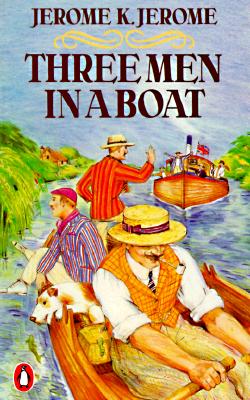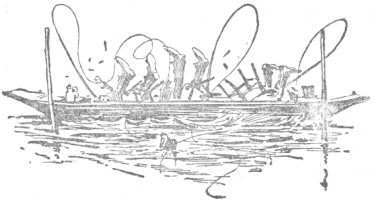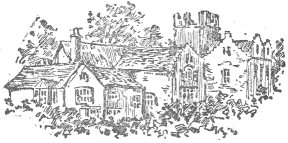And at Marlow we left the boat by the bridge, and went and put up for the night at the “Crown.â€
CHAPTER XIII.
Marlow.—Bisham Abbey.—The Medmenham Monks.—Montmorency thinks he will murder an old Tom cat.—But eventually decides that he will let it live.—Shameful conduct of a fox terrier at the Civil Service Stores.—Our departure from Marlow.—An imposing procession.—The steam launch, useful receipts for annoying and hindering it.—We decline to drink the river.—A peaceful dog.—Strange disappearance of Harris and a pie.
Marlow is one of the pleasantest river centres I know of. It is a bustling, lively little town; not very picturesque on the whole, it is true, but there are many quaint nooks and corners to be found in it, nevertheless—standing arches in the shattered bridge of Time, over which our fancy travels back to the days when Marlow Manor owned Saxon Algar for its lord, ere conquering William seized it to give to Queen Matilda, ere it passed to the Earls of Warwick or to worldly-wise Lord Paget, the councillor of four successive sovereigns.
There is lovely country round about it, too, if, after boating, you are fond of a walk, while the river itself is at its best here. Down to Cookham, past the Quarry Woods and the meadows, is a lovely reach. Dear old Quarry Woods! with your narrow, climbing paths, and little winding glades, how scented to this hour you seem with memories of sunny summer days! How haunted are your shadowy vistas with the ghosts of laughing faces! how from your whispering leaves there softly fall the voices of long ago!
From Marlow up to Sonning is even fairer yet. Grand old Bisham Abbey, whose stone walls have rung to the shouts of the Knights Templars, and which, at one time, was the home of Anne of Cleves and at another of Queen Elizabeth, is passed on the right bank just half a mile above Marlow Bridge. Bisham Abbey is rich in melodramatic properties. It contains a tapestry bed-chamber, and a secret room hid high up in the thick walls. The ghost of the Lady Holy, who beat her little boy to death, still walks there at night, trying to wash its ghostly hands clean in a ghostly basin.
Warwick, the king-maker, rests there, careless now about such trivial things as earthly kings and earthly kingdoms; and Salisbury, who did good service at Poitiers. Just before you come to the abbey, and right on the river’s bank, is Bisham Church, and, perhaps, if any tombs are worth inspecting, they are the tombs and monuments in Bisham Church. It was while floating in his boat under the Bisham beeches that Shelley, who was then living at Marlow (you can see his house now, in West street), composed The Revolt of Islam.



